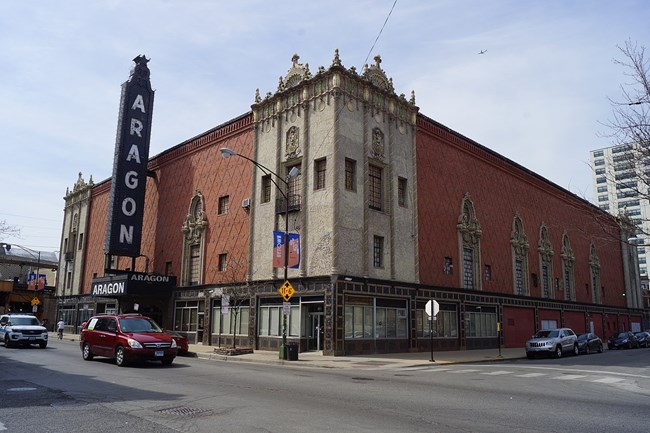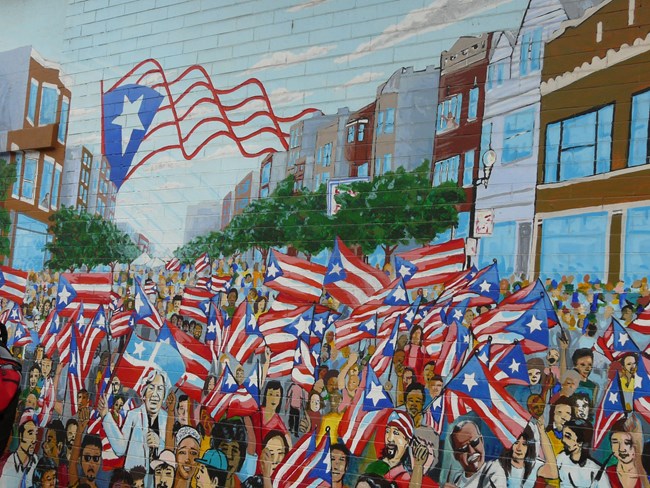Last updated: August 2, 2023
Article
Chicago Salsa
The rhythm and roots of salsa are scattered throughout Chicago’s North and Near West Sides. Unlike other salsa hubs such as Miami, Chicago salsa mostly drew from Puerto Rican influences.

Photo by Goldnpuppy, CC BY-SA 4.0, Wikimedia Commons.
When Puerto Rican immigrants first arrived in Chicago during the 1950s, they brought the foundations for salsa with them. Music provided a way for Puerto Rican immigrants to connect with what felt like home. As they established immigrant communities, they also contributed to the development of salsa in the Chicago.
The earliest salsa venues emerged in the Lincoln Park and Lakeview neighborhoods and along Harrison Street. The Puerto Rican Congress of Mutual Aid, for instance, became an important gathering space to make and share music. Carlos “Caribe” Ruiz founded the Congress as a social club in 1948. Besides offering performance space, Ruiz launched Ebirac Records. It was one of the first labels focused on Chicago salsa.
Local promoters also spread Latin music to theaters and dance halls throughout the city. In 1954, Rafael Cardona introduced Cortijo y su Combo to the Ashland Auditorium. Across town, Florentino (Junior) Mitchel debuted El Gran Combo de Puerto Rico to Uptown’s Aragon Ballroom.
By the 1960s, gentrification and construction of a new University of Illinois campus forced many Puerto Ricans to move out of Lincoln Park and Lakeview. As the community reestablished itself in West Town and Humboldt Park during the 1960s, new salsa spaces appeared. By the 1970s and early 80s, promoters and performers had opened dozens of their own clubs. In these venues, notable performers such as Vitin Santiago, Diego “El Cubano” y su Combo, and Rafael “Congo” Castro captivated audiences. At the Mirador, Tito Puente and His Orchestra played as the house band.

Photo by Emily, CC BY-NC 2.0, Flickr.
In Humboldt Park, six blocks along Division Street became the Puerto Rican community’s economic, cultural, and political hub. Now known as the Paseo Boricua (Paseo Boricua), this cultural corridor serves as the site of cultural parades, festivals, and a Latin dance studio. Through these events and spaces, salsa continues to act as a unifying force for community members to celebrate culture and resist gentrification in Humboldt Park.
Paseo Boricua received official recognition in 1995. At each end of the corridor, the city constructed a towering steel sculpture of the Puerto Rican flag. The Paseo Boricua Gateway Flags were designated as a Chicago Landmark in 2022. Chicago is a Certified Local Government.
This article was researched and written by Jade Ryerson, Cultural Resources Office of Interpretation and Education.
Borinqueno Con Sabor. La Salsa de Mi Barrio: Chicago's Old School Salsa (blog). http://salsadelbarrio-chicago.blogspot.com/2011/.
Franklin, Michelle. "Paseo Boricua: The Rise of Chicago's Puerto Rican Promenade." Midstory. August 17, 2022. https://www.midstory.org/paseo-boricua-the-rise-of-chicagos-puerto-rican-promenade/.
López, José E. and Eduardo Arocho. "Paseo Boricua Gateway Flags: West Division Street at Artesian Avenue [2400-West] and Mozart Street [2800-West]." City of Chicago Landmark Designation Report. May 5, 2022. https://www.chicago.gov/content/dam/city/depts/zlup/Historic_Preservation/Publications/Paseo_Boricua_Gateway_Flags_Final_Report.pdf.
Numero Group. "Carlos 'Caribe' Ruiz and His Orquesta La Solución." Stories. https://numerogroup.com/blogs/stories/carlos-caribe-ruiz-and-his-orquestra-la-solucion.
Wang, Oliver. "The Secret History of Chicago Salsa." All Things Considered (podcast). NPR. March 30, 2011. https://www.npr.org/2011/03/30/134980252/the-secret-history-of-chicago-salsa.
